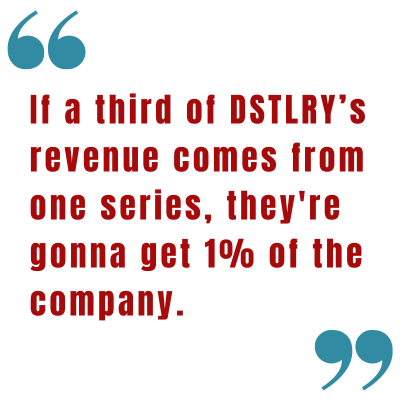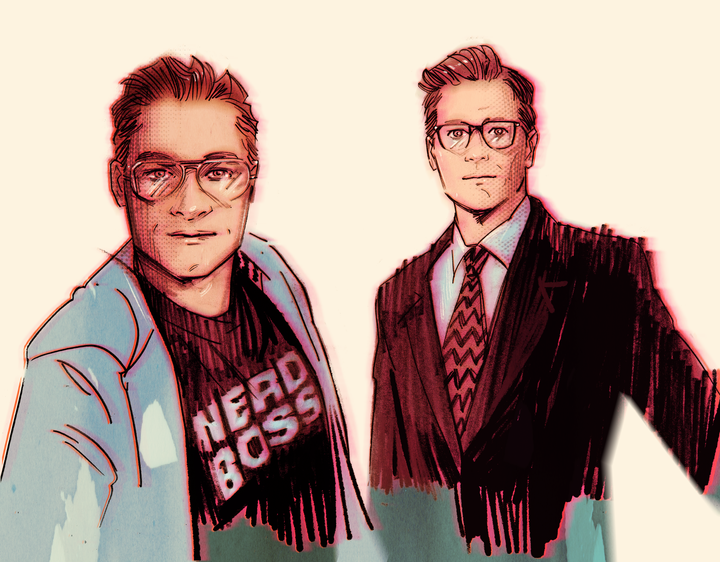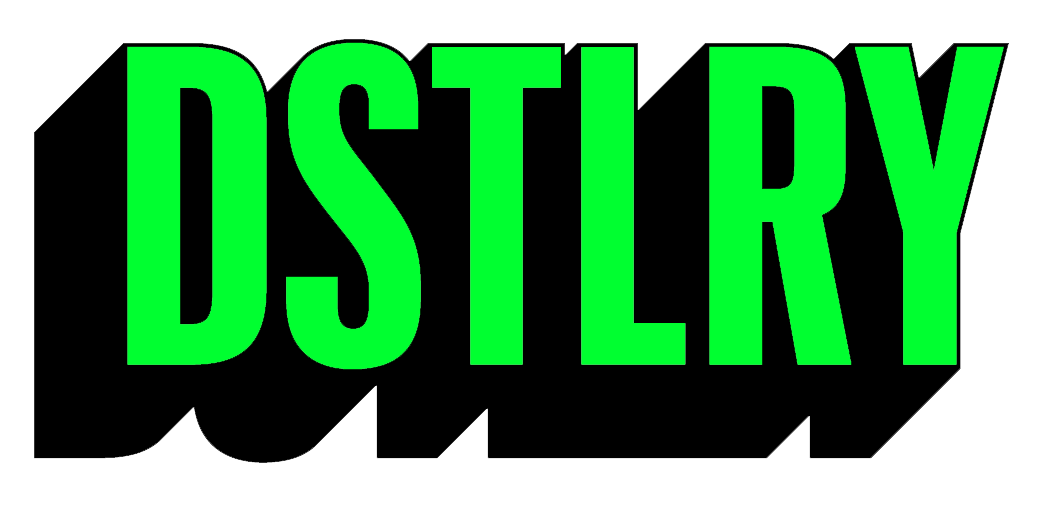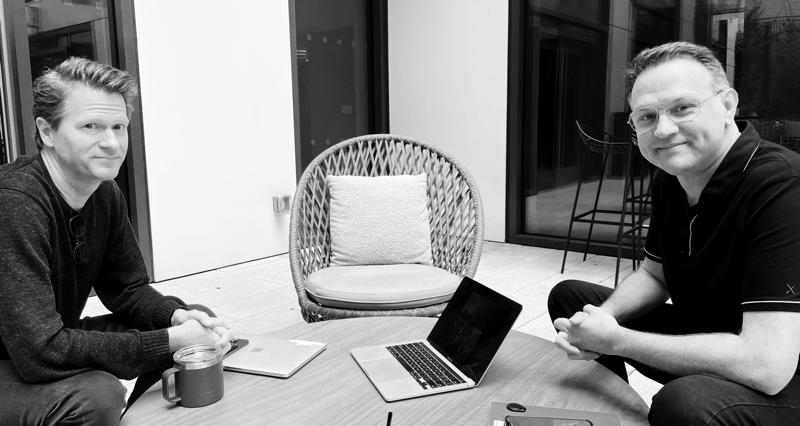As we mentioned earlier today, the team behind Comixology Originals, David Steinberger and Chip Mosher are back as co-founders of a new comics publisher, DSTLRY which they hope will innovate in the way that comics publishers treat creators and readers. Steinberger is the co-founder of Comixology, and led it through its acquisition by Amazon. Mosher joined as Head of Content starting in 2011. Both left Comixology/Amazon as it was integrated more fully into Amazon’s system; rumors that the duo were working on a new venture have been flying for months.
Now that project has been revealed, DSTLRY, a new comics publisher that offers Founding Creators – a who’s who of contemporary comics including James Tynion, Scott Snyder, Becky Cloonan, Jock, Ram V and many more – equity in the company and readers a marketplace for digital collectibles, billed as a “Stub Hub for comics.” Creators will own their IP, and successful creators will share in the equity of the company via a 3% pool set aside for that purpose.
The new venture has brought in Kodansha US and Group Delcourt as investors, along with video game exec John Schappert, tech strategist Mike Vorhaus, and producer Lorenzo di Bonaventura.
According to the NY Times launch article, DSTLRY (pronounced “distillery”) will launch at Comic-Con with The Devil’s Cut, an anthology featuring all the Founding Members.
I sat down in person with Steinberger and Mosher last week on a foggy NYC rooftop to find out more about the venture, and just why they are getting back into the comics game. Two wacky kids who decided to publish comics. What could go wrong?
This interview has been edited for clarity and length.
MacDonald: So why, just why? Why did you want to do this?
David Steinberger: Because we thought things could be better, particularly for creators. And because we had some realizations about digital and the way the market works here in the US, for Western comics as a drop culture, collectible space.
MacDonald: Can you explain what you mean by drop culture?
Steinberger: Drop culture exists in streetwear and style, say Supreme. They announce a product, people line up outside the store, there’s a limited supply, when it’s gone, it’s gone. And people love it. There are lots of people who just really enjoy both trying to get it in the first place, and the hunt for getting it later. So sites like StockX have become very popular for shoes, streetwear and vinyl toys.
Comics have that built in, simply by being released on Wednesday. The retailer’s bought what they bought, you have to have a pull list or you have to be there on Wednesday if you want to make sure you’re getting that book, particularly a popular one. We didn’t have control of price, of course, at our last job. But what we found is that the publishers are very resistant. One of the reasons we did well, I think it’s because we listened to publishers and their problems. And they were really afraid of digital ruining print, because it’s so efficient for them. We talked about this a lot very early on. And one of the reasons we succeeded was because we’re empathetic, and we listened, and we understood their fear.
What we didn’t realize is that, 11 years later, the price of digital single issues – even though we’ve proven over and over that digital makes print readers – was going to be the same [price] as print still. And so you’re talking about 2023 prices, generally speaking, $4 or $5, sometimes even more, for a really short amount of entertainment. Japan became a huge digital marketplace, compared to print, much bigger, a way bigger percentage of print size. Some reports I’d read say over 50% of revenue comes from digital rather than print. Yet we still see numbers like 10-15% [the amount of digital as part of revenue in the US]. And we’re trying to figure out, why is that? Well, it’s because there’s no corollary to that culture in the single issues.
With the experience we had in Comixology Originals, we looked at every point of the creator journey with the publisher – with tons of complaints out there. Everywhere from like, they own too much of my IP or all of it; I have no control, don’t get paid for it. If there’s a movie on the one end, work for hire on the other end. Everything from “I have to do everything, I can kickstart, I gotta pay myself” to “I have to do a second or third job to get my work done. And then I have to do my own marketing, my own PR.” It’s that plus a dozen things more.
Chip Mosher: On a macro level, we looked at how can we build a more equitable and sustainable future for creators? And if we did that, then we’ll make stuff better for readers and for retailers. We take treating creators the best way possible as a domino effect down to the reader and the retail.
MacDonald: So what is the timeframe for this?
Mosher: We’re announcing the formation of the company, and revealing the founding creators. Currently, we’ll have a debut book ready for Comic-Con. And then in the fall, we’ll start rolling out our first series.
MacDonald: So obviously, when everybody sees you guys are doing this company, they’re gonna assume you’re doing digital. Is it going to be print and digital, only digital? Digital first?
Steinberger: It’s absolutely going to be print and digital at the same time simultaneously.
Mosher: The business plan started with print. And we added the digital components.
MacDonald: But there will be digital scarcity?
Steinberger: Yeah, exactly. So the idea is that, the vertical marketplace is DSTLRY.co only. People can come in and buy single issues the day it comes out, probably Wednesday morning. And we’ll figure out long term how it’s working.
Mosher: What we’re trying to do with digital is replicate the fun of collecting print single issues in the digital marketplace.
Steinberger: Right now we’re planning on releasing Wednesday and turning off sales on Tuesday. Whatever sells, sells. And then there will be a vertical marketplace for consumers, on DSTLRY.co. for consumers to sell to each other.
Mosher: With a perpetual royalty on every initial sale and resale going back to the creator.
MacDonald: I know you’ve used the term “digital collectibles” in some early PR, which is what they’re calling NFT’s nowadays. So let’s be real clear about this. Are you doing NFTs?
Steinberger: You’re going to buy our books with dollars. And only on DSTLRY.co. One complaint from creators is something that affects both collectors and creators, getting their work stolen and sold as an NFT an OpenSea. And as soon as you have a hit NFT, OpenSea fills up with people looking like you, trying to take your name and make an account for a little bit of time. They might fool a bunch of people. If you see anything from DSTLRY on OpenSea or anywhere else on a public NFT, that’s not us.
MacDonald: Is the blockchain involved with this?
Steinberger: We’re considering a ledger database. So it gets written into a ledger so that we can prove ownership and give people discounts on the next issue. Whether you own this issue, or maybe a variant cover only you can get, or even in real life experiences – we’re planning some fun stuff with that.
It’s what you would consider a managed private ledger which is to keep the costs down and be able to do real customer service. Like if we put if you do something on the public blockchain, not only is there the fraud and all that energy consumption but the way people look at it.
Mosher: There’s provenance. So let’s say we give 10 comp copies to Scott Snyder and then he gives those away to 10 fans, then those fans know that Scott owned it before them and then if they want to resell it on the marketplace, they can resell it as “Hey Scott Snyder used to own this.” Again, trying to bring the fun of collecting print to digital.
MacDonald: But you’re not destroying the forests with this?
Steinberger: No. This shouldn’t affect the electricity grid. We’ll have a couple of servers but this will be just like a Kindle purchase and an Apple iBooks purchase. No more energy than that.
Mosher: In our press release, we use StubHub as a metaphor for what we’re doing. What I like to tell people, it’s like Apple iBooks. But you can resell the books, on that same page. We have nothing to do with [the NFT market.] It’s a closed marketplace, you have nothing to do with any sort of distributed, decentralized network that’s taking up energy consumption.
MacDonald: Everybody’s gonna ask this, so I just want to make it clear.
Mosher Yeah, that’s why we have definitive answers. But we’re not participating in the decentralized cryptocurrency marketplace.
MacDonald: What makes this this fun? Are you doing other kinds of collectibles? Will there be variant covers?
Steinberger: We’re gonna dig into all that stuff. And then we’ll see what works and what doesn’t and adjust to make sure that the creators and the customers are getting the right kind of benefit.
MacDonald: So let’s talk about that creator benefits. They are like investors in the company?

Mosher: We have two separate things here. We have our founding creators who literally co-own the company with us, and not just their intellectual property. Then we also have this 3% pool that everyone’s.
MacDonald: So this is sort of like a 21st century Image in a way. So what’s in it for you guys?
Steinberger: We think that by treating craters this way, they’ll bring their best commercial work and we think that it can be profitable on the print and digital, just hit book level.
Mosher: Certainly the company is a profit participant in the IP. We have different contractual terms that are super fair, and incentivizes us to do as right as we can for them, as they are doing for us.
MacDonald: So now you’re wading into the print world, and the world of Diamond and Lunar and all that. Are you going to stick with traditional comics distribution? Or are you going to do a Bad Idea, who have been very innovative in what they’ve been doing.
Mosher: We’re pals with Dinesh [Shamdasani] and Atom Freeman [founder and marketing for Bad Idea]. And, I think that they’re having a great time over there at Bad Idea. We’re definitely doing something very different from what they’re doing. We’ve talked to all four distributors that are out now, which has been super interesting. Last time, I was involved in print publishing, there was one [periodical] comics distributor. Now there’s three and about to be four. And so we’ll have an announcement about our distribution soon. But yeah, we’ll be available at all the local comic shops.
MacDonald: So David, I don’t know what you can say about this, but last we heard you had a big new job at Amazon, and you left that big job, I guess, to do this. What can you say about that?
Steinberger: I had been in the job [at Amazon], and was going to take a couple of months off, and I talked to Chip. He had this idea. And I thought I could add some expertise and some good ideas to it. I thought we could really do something special. Our first job was to see if the creators agreed with the kind of approach we’ve taken. And of course, we found they did. We worked with them a lot to figure out the right patterns and the right equitable contracts. As for my journey, I pitched a new business over at Amazon, got it funded, I worked on it a little bit and just honestly, decided I wanted to–
Mosher: I think you’re underselling it! David pitched a new business to the CEO of Amazon, and it got approved. And he got allocated a lot of people to hire. And it was a big, big deal.
Steinberger: Yeah, it was fun to be on that stage. I think that’s going to be a great business for them. I’m very excited to see when it comes out, whenever that’s going to be. But I wanted to move on. It’s funny, when I talked about it with my wife, maybe the whole thing was getting to that stage and getting some big company to go, “Yes. It’s a great idea. Let’s do it.” And then I didn’t really want to do the entire thing. I wanted to get back to small. I wanted to be my own boss again. And I thought it’s a good time to do that.
MacDonald: Well, no telling what would have happened to this new business with all this contraction.
Steinberger: I’m hoping they’re still at it, but I have no idea with the cuts they’ve made.
MacDonald: I went and talked to Amy Chu’s class at SVA the other day, and she brought in some print, periodical comics. And most of the kids there said it was the first time they’d ever held one. It was the writing class for SVA cartooning majors. Nobody I’ve told that anecdote to is surprised by it, just because the periodical is kind of an old fart format now. Will you be doing collected editions, graphic novels?
Mosher: Absolutely. The digital singles will live in DSTLRY.co, in our app, and our online store, and then we’ll have collected editions widely available digitally and at all the digital vendors and we’ll have print.
Steinberger: We think that storytelling is best served by taking advantage of every [format], if it’s appropriate for the stories and the popularity. We want to do everything.
Mosher: There’s still a lot of life left in the periodical. Our standard will be the oversized 48 page format, a little bit larger, a little bit bigger. It gives the artist and writer a bit more scope for the storytelling, very widescreen. I think that’ll be very appealing for people. Hats off to DC for really pioneering that format. In a wide and mass way it’s more satisfying for the reader. It’s more satisfying for the creative teams. And I think the margins are more satisfying for the retailers.
David’s the CEO I’m the CCO and so he and I have a lot of cross collaboration. Up until recently, it was a two person company and now we’ve added a third, A couple weeks ago, Sean Edgar started as our Senior Director of Communications and Marketing.
MacDonald: Content wise how do you set yourself apart? I mean, there’s a lot of books out there. And obviously, story is still what is the most important.
Mosher: I think that the editorial vision that we have for the company is doing stuff that skews a little older, sort of PG, PG 13, very genre based, much like what we did at Comixology Originals. And what David and I said at the outset of Comixology Originals, was one thing we’re not going to do is superhero books. And the day we said that is the day we got a superhero pitch that we couldn’t turn down. As with Comixology Originals, the creative teams are managing their own books, hiring their own editors, and doing their own thing. Will Dennis is our founding editor, we talk to him daily, consulting with him on creator issues. Obviously, Will has a storied career in comics and has his ear to the ground, and makes sure that we don’t take a wrong step in that sphere. Also people pitch him projects all the time that are looking for a home. So it’s great to have him on board and as an equity participant in the company.
Steinberger: One of the things that we really believe in is that if you treat the creators well, and they become owners in the company, as we’ve added founding creators over these last few months, you can see them starting to behave like owners. [They] started thinking about what kind of story is really going to play out there, the idea being that they’ll bring their most commercial, their best work to DSTLRY, because that’s a place where they’ll be rewarded for the long term. If they bring a hit, or if somebody else that they know is also a great creator brings the hit, they’re all participating together. We’re hoping that works, and it seems to be appealing to the creators.
Mosher: The other thing by having the creators package the books themselves, work with the editors that they like, the letterers that they like, etc., we’re able to spend more money on marketing and PR and getting the word out. So we’re looking forward to really promoting the work.
MacDonald: That’s another thing that the kids in the writing class were being told was that if you go with a publisher, make sure they promote your work. You have a lot of great backers, what is their relationship to this?

Steinberger: Their relationship is that they’re excited. The investment came with no contractual relationship, aside from one we’re not talking about yet. For Guy [Delcourt founder of Groupe Delcourt, a successful French comics publisher] specifically, he became a mentor of mine during Comixology, the first French publisher to get on board with Comixology. I really learned a tremendous amount from him, and I have a lot of respect for the success as the biggest independent publisher of bande desinee. And frankly, he’s one of the first people I reached out to once Chip and I decided we were going to work together on this. We’re honored that he [joined] but there’s no contractual relationship there other than its investment.
I started an advisory team over in Tokyo for manga for Kindle. And of course, we had established a relationship with Kodansha even before that in the in the US and we just have a good relationship with them. They liked the idea, and we’ve actually borrowed some of the contractual relationship stuff from them. They just seem interested in what we’re up to, and potentially being a part of it. I just very lucky that we have an international [component], and we have a couple of really great publishers that are also independent. Kodansha is also an independent publisher that gets it.

Mosher: And Alvin Lu’s [head of Kodansha USA] been a great, great friend, to me personally, and that I’ve done a ton of business with over the years. He was one of the first people I reached out to when this all started, and was really instrumental in a lot of my early things. Great advice from both of these. One of the great things about being at Comixology, is all the international exposure that we got to the whole world of comics, and so it’s just really important to have an international scope and a viewpoint to the company from day one. And so having both Kodansha USA and Groupe Delcourt be investors is not only flattering, but just…it’s kind of a dream come true.
MacDonald: You also have Lorenzo di Boneventura, a well known Hollywood type. With the streaming consolidation happening, the comics to streamer model is still happening although slower, but people still love comics IP. Is media development part of your business plan?
Mosher: It’s not the core driver. Great comics first. Our initial P&L is all based on revenue from print, publishing and digital. That’s it, and I don’t even think we have any Hollywood money in the P&L currently.
Steinberger: We really needed to and wanted to be profitable on the comics.
MacDonald: What are some of the lessons that you learned on Comixology Originals that you’re bringing to this?
Mosher: Oh, gosh. I think just communication is key, just being being as upfront, early, and often with everyone, about expectations and about what’s happening and just having open lines of communication.
Steinberger: My turn to take over for you, Chip. You’re under representing yourself. The first sign of it was when he left Comixology and Twitter was just full of all these people just going, oh, my God, I can’t wait to work with you again. And then in talking with the creators, as we’ve done the deals, Chip has created a trust with creators where they know he will talk to them. When they call, he will return their email, he will reach out to just see how they’re doing. And that seems to be a rarity in this business. That’s my impression from the creators at least and frankly, [at Comixology] we treated everybody very well. We paid on time we, we supported their vision, we gave them commentary when it was necessary but in a way that’s empathetic and thoughtful. Chip was just really, really good at that. And I often have to have him temper my language. Because I’m the suit, apparently, in this equation at this point, although I feel like it’s coming off.
Mosher: The t shirt under the suit is coming out more and more.
Steinberger: I honestly think you’ll hear this if you talk to some of the creators, they’ll all say, we love Chip. And we trust David and Chip because they have treated people well and fairly and have tried to do the right thing by comics this entire time.
Mosher: It’s super flattering.
MacDonald: Well, treating people well while working for a big tech giant is laudable, which is a little ironic, I guess. I mean, people expect to be treated poorly. The larger the company, the more poorly they expect to be treated. Although it should be exact opposite.
Steinberger: It’s just a giant corporation. It’s hard because you don’t know everybody and it’s hard to see people as different than numbers when your back’s against the wall and you’re subservient to the shareholders first in a public company. I don’t envy a giant public company CEO.
MacDonald So that’s it. David, you’re sticking with comics.
Steinberger: I can’t help it. I love it. The CEO stuff, the original stuff at Comixology was just the most fun I’ve had in years and I had a pretty good time coming in through Amazon. I’ve really had a great few years with the Japan stuff and the subscription services and trying to continue the spirit and culture of Comixology as long as it could last there.
Mosher: I don’t think people realize that David used to design investment pitch decks for a living and has a fantastic eye for design and actually has a fantastic story sense. So we make a good team.
DSTLRY.co is live now.











Oh, they’re doing a Quibi.
Hey! the guys who made ComiXology and then sold it to Amazon (who then shuttered it because it doesn’t make any money) are doing an NFT scam! Sounds really great.
Not often you see so many awful ideas in one place.
Giving equity to the content creators sounds awesome to me!
“So let’s say we give 10 comp copies to Scott Snyder and then he gives those away to 10 fans, then those fans know that Scott owned it before them and then if they want to resell it on the marketplace, they can resell it as “Hey Scott Snyder used to own this.” Again, trying to bring the fun of collecting print to digital.”
Absolutely incredible that someone said this with a straight face.
They seem to have confused “Fun” with “FOMO”.
This is f-ing stupid. “Digital collectibles”, whether they’re technically NFTs or not, need to die. The whole advantage of non-physical distribution is NOT being print-run limited. Hell, it’s why the “Netflix model” (“all you can eat” within a subscription) is becoming popular – it could never have been done physically owing to limitations of stock*.
*Yes, Netflix started as a mail-order disc rental service, but you were limited in how many discs you could rent at once in your sub, then you had to send them back to get new ones. That’s very different to “modern”, streaming-based Netflix/et al.
Geez, some harsh and petty comments up there. No NFTs btw, if you read the interview you’d have known. I think this could be great. Now if we can talk them into giving retailers a commission like Comixology once attempted, it can truly bridge the gap, AND get comic shop workers into being the guide-to-good-works consultants we love them for.
@rexedhlundd0abce673c
They are non-fungible tokens. “Non-fungible” means each one is (technically) unique – physical things are generally at least technically non-fungible, although not to a degree that makes any difference with the vast majority of mass produced stuff – “token” is the entry on the “ledger database”, which is usually “the blockchain” (note that the blockchain virtually never stores the actual content, just a URL to it. Which can break like any link, only it can’t be patched to link to a new server if the host DOES go down), even if not in this instance.
And I’ll say it again, a huge part of the benefit of non-physical stuff IS the “fungibility” of it. One reason why DRM is bad – it breaks that. If you bought a downloaded music track from most stores in the early 2000s, you can probably no longer play the original file, because you needed to “authorise” devices to play it, and even if you didn’t “use” all your (limited) authorisations, the servers to do so are long-dead. (See also: games which require an online connection even for single player mode. And then the servers shut down…) At least subscription services don’t pretend to sell you anything more than temporary access, at the cost of stuff which didn’t get a permanent (non-revokable) release becoming permanently unavailable by any legal means if removed (Hi HBO Max!).
This “digital collectibles” thing is DRM+a slice of toxic FOMO with the artificial-limit thing.
I don’t know what it says about the industry (I suspect it says more about financiers), but it is uber-depressing that some of the most notable new publishers have all been tied heavily to gimmicks (Bad Idea, Dstlry, Frank Miller Presents) or the parent company has no clear path to being profitable and is likely to fold within the next year (Substack).
All the hogwash about these not being just comic NFTs aside, I am really curious about the physical distribution of these. If they don’t go with PRH, Diamond, or Lunar for distribution I guess I won’t be carrying them for my store. I think overall this isn’t a great idea but if it helps get creators paid its fine. The gross taint of NFTs will keep me from buying any of this stuff digitally, but if creators want to prey on their fans in a digital marketplace that is their choice.
I hate the idea the digital copies will be artificially limited. People shouldn’t be forced out of buying something digital because you missed the launch by a few weeks or whatever it ends up being. And if the cut off isn’t something obnoxious what is the point of making it limited at all?
Comments are closed.